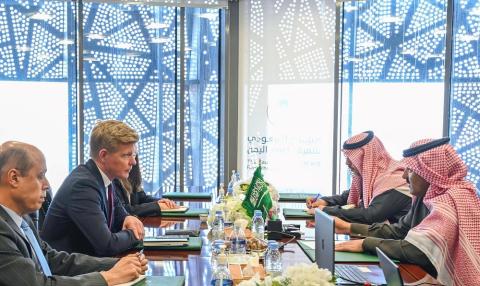
The choice of Swedish diplomat Hans Grundberg as the new UN special envoy to Yemen bodes well for the organization’s efforts. He is the fourth UN special envoy to Yemen and the one with the most experience in the country and the Gulf region. As EU ambassador to Yemen since 2019, Grundberg succeeded in building a consensus within the European bloc, aligning it with the global consensus.
Grundberg is a career diplomat and Sweden’s point man on the Gulf region and conflict resolution. During Sweden’s EU presidency in 2009, he chaired the Middle East and Gulf working group at the European Council in Brussels. He subsequently headed the Gulf Division at the Swedish Foreign Ministry, before becoming the EU ambassador to Yemen in September 2019. As EU ambassador, Grundberg made considerable efforts to bring peace to the country, stressing the need for consensus and aligning EU efforts with the rest of the international community. In February, he led a high-level delegation to Aden, the interim capital, in a show of support for the unity government. The European delegation included the ambassadors of Germany, Belgium, France, the Netherlands, Ireland, Finland and Sweden, as well as the deputy ambassador of Norway. His consensus-based efforts were in marked contrast to some of his predecessors, who fielded their own initiatives, inadvertently emboldening the Houthis to disregard UN mediation efforts.
It is not a secret that the UN has so far failed to bring Yemen any closer to peace than when it started its mediation efforts in 2011. Many Yemenis, perhaps unfairly, blame the UN for prolonging their agony. The GCC Initiative of 2011 charted a clear road back to peace and was welcomed by the Yemeni government and the opposition. However, as UN mediators took over its implementation, that consensus unraveled. Through the tireless work of Ismail Ould Cheikh Ahmed, the UN’s second envoy to Yemen, the Yemeni parties came very close to an agreement during five-month-long talks in Kuwait. However, the UN suddenly decided in February 2018 to change envoys, just as Ahmed was close to nailing down the deal.
The past three years have witnessed very little progress and much backsliding. Last week, Elana DeLozier, a Washington-based Yemen expert, wrote after a visit to the region: “The next envoy will be asked to find a quick path to peace where no obvious one exists, armed with little leverage for budging the emboldened and well-positioned Houthis.” A quick path back to peace is exactly what Yemenis and the region at large hope that Grundberg will find, because the precarious humanitarian situation in Yemen and region-wide security challenges make it imperative to do so in very short order.
There are new elements that should help him that were not there when his predecessors were appointed to the task. First, in March, Saudi Foreign Minister Prince Faisal bin Farhan announced a new initiative to end the war. It included a UN-supervised ceasefire, the relaunch of political talks, an easing of restrictions on imports through Hodeidah, and the reopening of Sanaa airport. Second, the US in February appointed veteran diplomat Timothy Lenderking to be its special envoy to Yemen. His appointment has re-energized the peace process and he has been working closely with the UN, the government of Yemen and regional actors, in addition to reaching out to the Houthis. Early last month, an Omani delegation arrived in Sanaa as part of renewed efforts to mediate. In their June 17 meeting in Riyadh, the Gulf Cooperation Council (GCC) foreign ministers fully endorsed Oman’s efforts.
These new elements, plus the newly cemented consensus within the EU, thanks to Grundberg’s own efforts, and the UN Security Council consensus, as expressed in numerous resolutions and statements, chief among them being Resolution 2216 of April 2016, should all help the new envoy move in the right direction. He must build on previous agreements between the Yemeni parties, including the National Dialogue Conference outcomes, the GCC Initiative, the Stockholm Agreement, and the near-agreement reached at the Kuwait talks of 2016.
One should be realistic about the pace, no matter how urgent the situation might be. The crisis in Yemen has regional and international dimensions that should be deconstructed and dealt with in order to guide the peace process in the right direction. Here are some suggestions for the new envoy to consider.
First, a sustainable ceasefire should be prioritized. Previous attempts failed in part because the UN did not have monitors on the ground to report violations. The government of Yemen has welcomed the UN secretary-general’s call last year for a global ceasefire and Saudi Arabia has launched an important initiative that also includes a ceasefire. The UN could help gain greater support for these initiatives, operationalize them and ensure ceasefire sustainability.
Second, the UN should seriously consider establishing a peace mission in Yemen. Starting with ceasefire observers, the mission should extend to peacekeeping and peace building, as it has done in other hotspots around the world, including places less precarious than Yemen.
A quick path back to peace is exactly what Yemenis and the region at large hope that Grundberg will find.
Dr. Abdel Aziz Aluwaisheg
Third, humanitarian assistance is critical and should continue unfettered. The obstruction or diversion of aid, harassment of aid workers, and looting of supplies or allowing them to rot in warehouses should not be allowed. The new envoy should make it very clear that aid may not be used as a tool for political bargaining or self-enrichment.
Fourth, the search for a political solution should be resumed immediately, without waiting for a ceasefire. The shape of the political outcome must be articulated according to Yemenis’ own wishes: A democratic, secular and decentralized or federal system. The National Dialogue Conference of 2013-2014 put a considerable amount of flesh on that general concept. The outcomes of that dialogue, where the Houthis were represented, should provide guidance for the eventual shape of the Yemeni state. Presidential and parliamentary elections, as stipulated in the GCC Initiative and its implementing mechanism, need to be discussed to reassure Yemenis of a future free of divisive ideas of tribal and religious supremacy and attempts by a clerical elite to rule the country by divine right.
Fifth, the Yemen conflict must be de-linked from the international talks with Iran over its nuclear program, to avoid entangling the situation in an uncertain process that could be lengthy.
These are some, but not all, of the priorities for the new UN envoy. The most important first step, however, is to seek the views of Yemenis themselves.
Dr. Abdel Aziz Aluwaisheg is the GCC Assistant Secretary-General for Political Affairs & Negotiation, and a columnist for Arab News. The views expressed in this piece are personal and do not necessarily represent GCC views. Twitter: @abuhamad1
Disclaimer: Views expressed by writers in this section are their own and do not necessarily reflect Arab News" point-of-view










